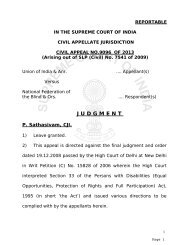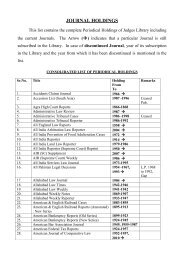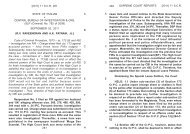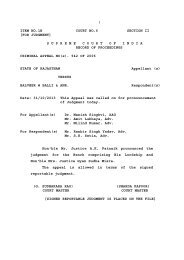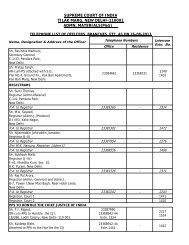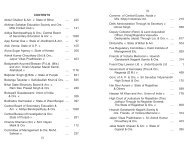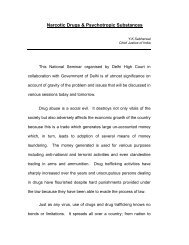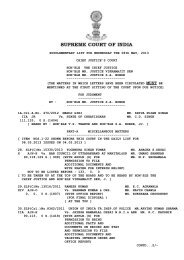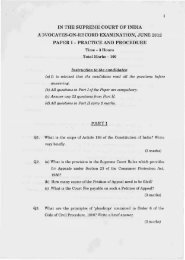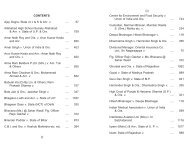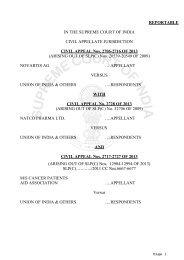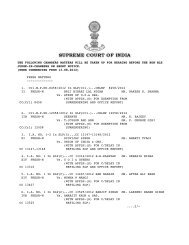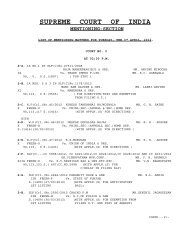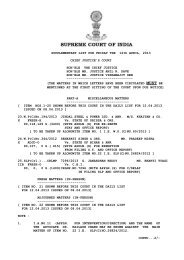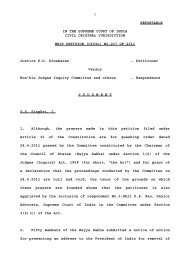Part No.IV - Supreme Court of India
Part No.IV - Supreme Court of India
Part No.IV - Supreme Court of India
You also want an ePaper? Increase the reach of your titles
YUMPU automatically turns print PDFs into web optimized ePapers that Google loves.
SARADAMANI KANDAPPAN v. S. RAJALAKSHMI &<br />
ORS.<br />
<strong>of</strong> the sale deed. In the absence <strong>of</strong> contract to the<br />
contrary, the purchaser is bound to tender the balance<br />
consideration only at the time and place <strong>of</strong> completing the<br />
sale. In this case there was a conscious effort to delink<br />
the terms relating to payment <strong>of</strong> balance price (clauses<br />
4, 5 and 6) from the term relating to execution <strong>of</strong> sale<br />
deed (clause 7) and making the time essence only in<br />
regard to the payment <strong>of</strong> the balance sale consideration.<br />
There was also a clear indication that while time would<br />
be the essence <strong>of</strong> the contract in regard to the terms<br />
relating to payment <strong>of</strong> balance price, time would not be<br />
the essence <strong>of</strong> the contract in regard to the execution <strong>of</strong><br />
the sale deed. The intention making time essence <strong>of</strong> the<br />
contract for payment <strong>of</strong> balance price was clear from the<br />
following: (a) clause 4 required the balance consideration<br />
to be paid in three instalments; (b) Clause 5 made it clear<br />
that if any <strong>of</strong> the dates <strong>of</strong> payment was subsequently<br />
declared as a holiday, then the next immediate working<br />
day would be the date <strong>of</strong> payment. This showed a clear<br />
intention that payment was to be made on the stipulated<br />
dates and even a day’s delay was not acceptable unless<br />
the due date was declared to be a holiday; (c) Clause 6<br />
specifically stipulated that the payments on due dates<br />
was the essence <strong>of</strong> the contract and in case <strong>of</strong> failure on<br />
the part <strong>of</strong> the purchaser the vendors would cancel the<br />
agreement. On the other hand, the terms relating to<br />
performance <strong>of</strong> sale clearly indicated that time was not<br />
intended to be the essence, for completion <strong>of</strong> the sale.<br />
Clause 3 provided that the execution <strong>of</strong> sale deed would<br />
depend upon the second party (purchaser) getting<br />
satisfied regarding the title to the lands, so also the nil<br />
encumbrance. The said clause did not say that payment<br />
<strong>of</strong> balance consideration would depend upon the<br />
purchaser getting satisfied regarding title or nil<br />
encumbrances. Clause 7 provided that the sale deed<br />
would be executed at the convenience <strong>of</strong> the purchaser,<br />
as and when she wanted them to be executed either in<br />
883 884<br />
A<br />
B<br />
C<br />
D<br />
E<br />
F<br />
G<br />
H<br />
A<br />
B<br />
C<br />
D<br />
E<br />
F<br />
G<br />
H<br />
SUPREME COURT REPORTS [2011] 8 S.C.R.<br />
her name or in the name <strong>of</strong> her nominee or nominees.<br />
Clause 12 provided that if the second party (purchaser)<br />
found the title <strong>of</strong> the properties to be unsatisfactory or<br />
unacceptable, the vendors would be put on notice about<br />
her intention not to conclude the sale and in such an<br />
event, if the vendors failed to satisfy the purchaser<br />
regarding their title, the vendors shall pay to the<br />
purchaser within three months from that date, all monies<br />
advanced by the purchaser till then. Clause 12 also<br />
provided that the payments <strong>of</strong> balance sale price in three<br />
instalments on the specified due dates were not<br />
dependent upon the further examination <strong>of</strong> title or the<br />
satisfaction <strong>of</strong> the purchaser about the title which<br />
showed that the purchaser on the basis <strong>of</strong> whatever initial<br />
examination she had taken <strong>of</strong> the documents, had<br />
unconditionally agreed to pay the amounts in three<br />
instalments and if the purchaser was not thereafter<br />
satisfied with the title or found the title unacceptable and<br />
if the vendors failed to satisfy her about their title when<br />
she notified them about her dissatisfaction, the vendors<br />
had to refund all payments made within three months.<br />
Thus it was categorically made clear in the agreement that<br />
time regarding payment <strong>of</strong> balance price was the essence<br />
<strong>of</strong> the contract and such payment was not dependent<br />
upon the purchaser’s satisfaction regarding title. Apart<br />
from that, the plaintiff in her evidence admitted that time<br />
for performance was the essence <strong>of</strong> the contract. Her<br />
evidence also showed that she apparently did not have<br />
the funds to pay the balance <strong>of</strong> Rs.75,000 due on 6.4.1981<br />
and Rs.75000/- due on 30.5.1981 as was evident from the<br />
Bank pass book. It was, therefore, possible that being not<br />
ready to perform the contract in terms <strong>of</strong> the agreement,<br />
the appellant had invented a modification in the terms <strong>of</strong><br />
the agreement. The Single Judge and the Division Bench<br />
recorded a concurrent finding that the time was the<br />
essence <strong>of</strong> the contract and that no change was agreed



